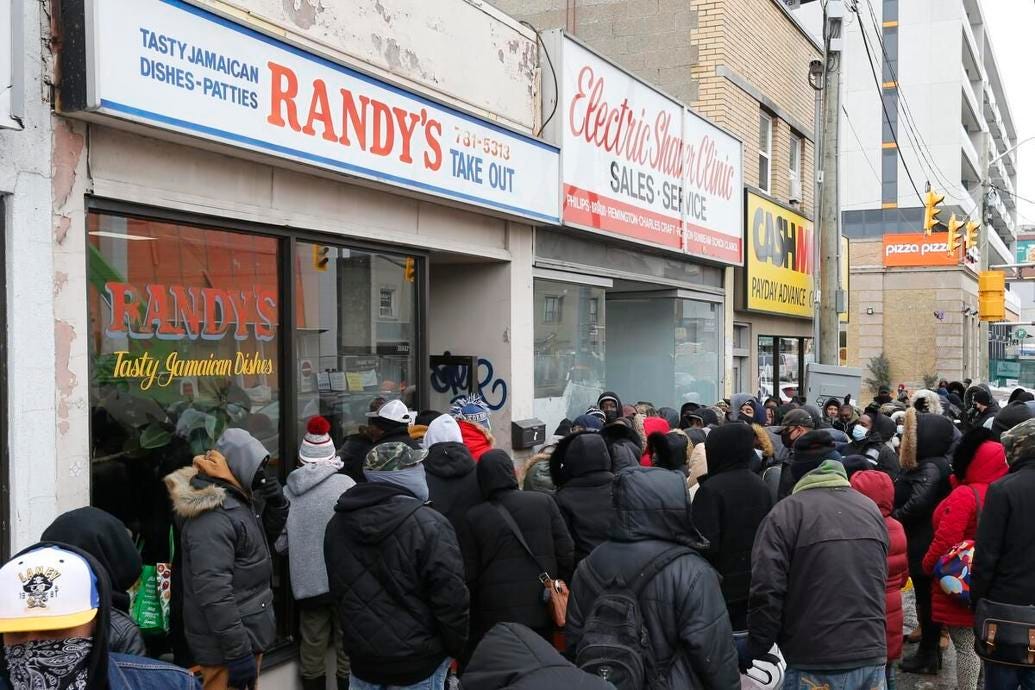A Jamaican Patty Vs. DeepSeek
To the average (uninitiated) visitor to Toronto, Eglinton West may merely be one of many otherwise nondescript neighbourhoods in the densely populated Canadian city. But for those who linger long enough to become familiar with the city’s multicultural milieu, they’ll soon discover that Eglinton West also goes by another name: Little Jamaica.
As the neighbourhood’s own website attests (yes, they have a website!) Little Jamaica “is home to the highest concentration of a diverse and dynamic range of Black and Caribbean owned businesses in the City of Toronto.”
On February 26, 2022, the neighbourhood was the site of a fair bit of hue and cry when some unexpected news broke: Randy’s would be shutting down. A beloved neighbourhood institution, the restaurant (first opened in 1979) served what many Torontonians labelled the best Jamaican patties in the city.
The restaurant cited the impacts of COVID, labour shortages and aging owners as some of their reasons for shutting down. Customers were devastated, with one neighbourhood resident lamenting: “With Randy’s departure it’s like we lost one of our grandparents.” He didn’t however grieve alone. In the two days between the announcement and the restaurant’s closure, hundreds lined up on 1569 Eglinton Ave. W to purchase the last of Randy’s famed patties.
But come July 2024, 1569 Eglinton Ave. W was flooded once again. This time because Randy’s was returning. The local paper, The Toronto Star, covered the heartening story of “a group of longtime customers who pooled their resources to take over the business” and reported that 100s lined up on the day of the patty shop’s grand re-opening.
The community’s delight at Randy’s re-opening extended to Dr. Jill Andrew, a Member of Provincial Parliament (MPP) for (the federal electoral district of) Toronto-St. Paul, who stood in the line with other eager customers, but unlike them, was clutching a plaque in hand to bestow upon the restaurant, in recognition of “the importance of Randy’s in the neighbourhood”.
Not unlike the crowd’s enthusiasm for Randy’s famed Jamaican patties, tech policy commentators are all agog with the news of the arrival of the R1 model from DeepSeek, a Chinese AI lab. But is all the fuss justified? And what are the possible implications for the AI community in India?
In our All Things Policy episode of the week, join Takshashila High-Tech Geopolitics Fellow, Rijesh Panicker, and Research Analyst, Shobhankita Reddy as they discuss the recent furore around DeepSeek. Listen in here to learn more.
And the Winners of the AI-Age Are…
If you were to ask Takshashila Director, Nitin Pai, to make a pronouncement on the header for this section, he would argue:
The winners in the age of AI will not only be those who’ve built the smartest machines, but also those who make use of those machines most effectively. AI, like fire, electricity and computing, is a general purpose technology in that it permeates and transforms all sectors of the economy.
To take a closer look at his thoughtful commentary on the impact of AI on the global economy and how India could best respond to these trends, follow this link.
A Window of Opportunity for India’s BioTech Sector?
If you’re looking for prudent advice on how India’s biotech sector can be bolstered (particularly in light of the recently released export control-related interim final rule by the US Department of Commerce’s Bureau of Industry and Security) look no further than our Geoeconomics Research Associate, Anisree Suresh’s recent Op-Ed in Moneycontrol.
She argues for a few key actions that India can take in order to possibly play a larger role in the biotech game, as it were:
“India can become a leading biomanufacturing hub if it can elevate its services to international standards with increased efficiency, innovation, and cutting-edge technology. India can only meet the competition from Japan, South Korea, and the EU markets if it can provide cost-efficient and innovative services to global biomanufacturing. India can only become an alternate vendor ecosystem if it addresses regulatory and quality challenges in its biotech services and has smooth approval processes to attract businesses to India.”
To read her analysis in-depth, follow this link.
The Paradox of the China-Pakistan Bilateral Relationship…
Does a paradox emerge when we consider Pakistan’s dependence on China?
Indo-Pacific Studies Programme Research Analyst, Rakshith Shetty and Dr. Sriparna Pathak (associate professor of Chinese studies and international relations at the Jindal School of International Affairs), would say: yes.
The bilateral relationship has once again been brought into sharp relief following Pakistan President Asif Ali Zardari’s recent five-day state visit to China.
In their recent Op-Ed in the Diplomat, Rakshith and Dr. Pathak together examine the layered complexities of the visit, and highlight the structural factors and evolving geopolitical context that have made the relationship fraught.
To read their insightful commentary in full, follow this link.
Takshashila Tabletop Trove!
Welcome to the Tabletop Trove of Dispatch! For regular readers of our Dispatch, it comes as no surprise to know that this section is intended to be a virtual repository of the books that sit at a high-table located in Takshashila’s physical office space in Bengaluru, Karnataka.
This week’s theme is ‘Prepping for Propaganda’ as curated by our Indo-Pacific Studies Staff Research Analyst, Anushka Saxena:
1. Whole Numbers and Half Truths: What Data Can and Cannot Tell Us About Modern India (Rukmini S.)
2. Smokeless War: China's Quest for Geopolitical Dominance (Manoj Kewalramani)
3. How Propaganda Works (Jason Stanley)
This edition of the Dispatch was written by Kripa Koshy, Programme Manager for Takshashila’s Post Graduate Programme in Public Policy.





